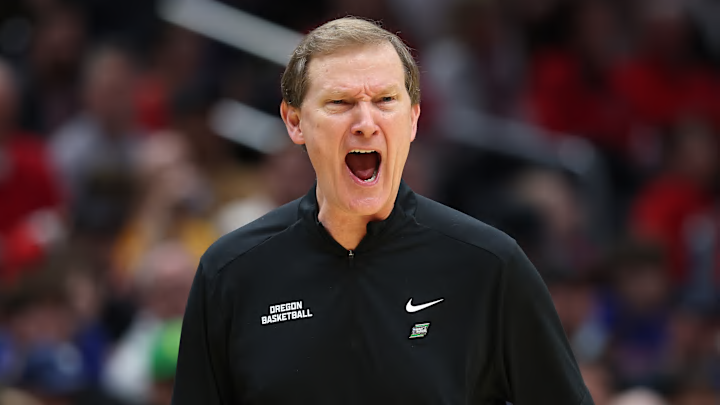Pac-12 style of basketball was in action on Sunday night. The two former conference foe played a game that consisted of 37 combined fouls, double-digit leads from each side, and hard-nosed defense throughout. In the end, it was the team from the desert who came out victorious.
It certainly didn't look like that would be the case early on. Oregon quickly found the same early success that helped guide them to an insurmountable lead against Liberty. Brandon Angel started the game off with five points in the first minute followed by a couple more three-pointers from Jackson Shelstad and Nate Bittle.
After just five minutes, the Ducks had crept to a 15-point lead with all the momentum favoring their corner. That's when things began to take a turn. Fouls became more frequent, turnovers came in bunches, and free throws became the team's arch-enemy.
The once large lead ticked down. 19-7 turned to 24-12. 24-12 turned to 26-20. By halftime Arizona managed to pull off a 16-point swing and reclaim the lead at 42-38.
"We had our opportunities," Altman said after the loss. "Came out great, but didn't play the way we needed to play to win the game."
Halftime wasn't the fix that the team needed. Oregon had to hang on and take the punches while Arizona increased its lead to 11. Jackson Shelstad's 25-point outing helped make the game a close finish, but the Ducks failed to reclaim the lead.
The final minute became a free-throw battle that the Wildcats utilized to their advantage. They went 7-8 from the stripe in crunch time to secure the 87-83 win over the Ducks.
1. Nobody could guard Caleb Love
The 5th-year North Carolina transfer finished the game with 29 points on 10/18 shooting.
Seniority is a massive component for success during March. Having it at the point guard position is arguably the most important. Arizona has that with Caleb Love who is extending his collegiate career one win at a time.
The former Tarheel has averaged just under 16ppg throughout 173 games at the college level. This is his 4th trip to the NCAA Tournament against Oregon it showed. He scored at all three levels with ease, hitting floaters over taller defenders and driving by them when they tried to step up.
Love finished with a game-high 29 points, had more assists than the entire Oregon roster combined, and knocked down the final two free throws at the end of the game to put the nail in the coffin.
2. Key building blocks
While the Tournament was short lived, we did get to see what the future of Oregon Basketball has in store.
There's a way to look at this game, this tournament run, and this season with a half-empty, half-full approach. It definitely was not the end that the team was hoping for, but there is something there that can be built upon during the offseason.
To start, Shelstad can definitely make that jump next season. He will be a junior and will continue as the lead ballhandler as long as he's in Eugene. He was one of the sole reasons why Oregon was able to stay in the game until the very end and was a big reason for the team's overall success on the year.
Shelstad was the Ducks' leading scorer in each of their two tournament games averaging 21 points during the span. He's improved each year and has started all but two games since joining the team in 2023. While he likely won't have many returning starters next year, there is a chance Bittle will come back for 2026. The senior big man was granted another year of eligibility by the NCAA and could make for yet another season featuring the Oregonian duo.
To add to those two key pieces, the tournament provided a platform for guys like KJ Evans and Mookie Cook to show out. Evans was the team's second-leading rebounder of the tournament and provided crucial defense while Cook received some of his first real action, splashing two threes in the first round and adding a block against the Wildcats.
Altman does have some holes to fill in the offseason, with five players finishing up their eligibility on Sunday night. The portal will likely be a tool again, but the returning pieces he does have harbor a great foundation for success next year.
3. Free throws are costly
17-24 (70.8%) to 12-22 (54.5%)
While there are a handful of reasons Oregon lost on Sunday, the one that should be accentuated the most is the egregious night from the free throw line. The Ducks are usually one of the better free throw shooting teams in the country sitting at just over 75% on the year in the regular season.
The same can be said for the past three postseason games too, where Oregon has gone 32-40 as a team.
"We won so many close games and we've hit a lot of critical free throws," Altman said. "I was shocked that we were missing some of those. Every area of the game matters. They go 17-24 and we go 12-22. That's a 5-difference and that hurts."
The advantage became evident in the final minute of play. Arizona held on to its lead with Oregon having little to no hope to reclaim it. The Ducks needed a 3 for what felt like the longest final minute in history, and the Wildcats' smart fouling and consistent free throw-making prohibited that.
